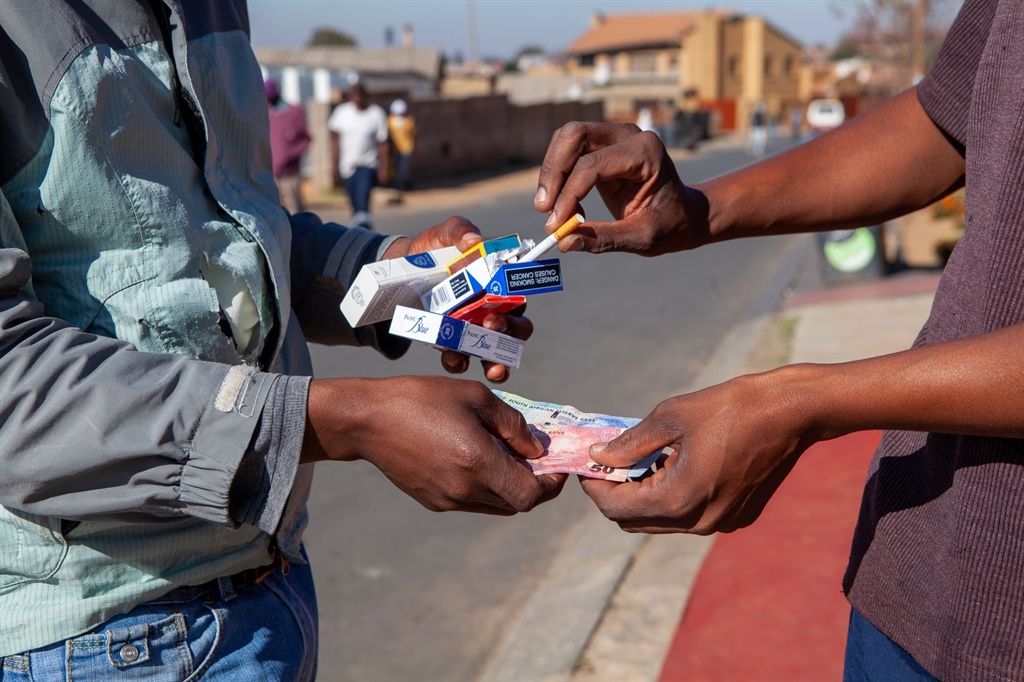Smoke and mirrors: 4 minutes – that’s how long it took to find banned cigarettes during lockdown
The UCT survey, conducted by the Research Unit on the Economics of Excisable Products, took place between April 29 and May 11. More than 16 000 respondents filled out the survey. From these responses, 12 204 analysable observations were derived.
The study found that 90% of respondents had purchased cigarettes during the lockdown, but that 46% of smokers were unable to buy their brand.
The purchasing environment also changed dramatically during the lockdown.
Before the lockdown, 56% of smokers purchased their cigarettes from formal retailers, but after the lockdown was imposed, only 3% of smokers were able to buy cigarettes from these retailers.
The percentage of smokers, who purchased from spaza shops, increased from 34% to 44%, and from house shops from 4% to 18%, according to the study.
The study also found that sales outlets that either did not exist, or that were inconsequential before the lockdown, became an important source of cigarettes.
READ | Supply and demand: As the lockdown continues, the price of illicit cigarettes continues to rise
Around 26% of smokers started buying cigarettes from street vendors, 30% purchased from friends and family, while 11% found cigarettes on WhatsApp groups, and “essential worker” acquaintances provided cigarettes to 10% of smokers.
Fin24 previously reported that the study found the ban on cigarette sales is failing in what it set out to do – and rather than stopping smokers from smoking, it could be setting up an illicit market for survival well beyond the coronavirus outbreak.



(Photo by Gallo Images/Papi Morake)
“While the original intention of the ban was to support public health, the current disadvantages of the ban may well outweigh the advantages. Smokers are buying cigarettes in large quantities, despite the lockdown, and unusual brands are becoming prevalent,” the research unit said.
Foundation for a Smoke Free-World study
An international survey conducted by the Foundation for a Smoke Free-World, which included South Africa, also found that the majority of respondents were still smoking during the lockdown.
The survey, which primarily focused on the impact of isolation on the behaviour and health practices of smokers, found that 64% of smokers in South Africa continued using tobacco products during the lockdown as a coping mechanism to negate extreme stress and anxiety.
The survey noted that, prior to the pandemic, 66% of South African smokers surveyed said they used nicotine and tobacco as coping tools. During the lockdown, 64% of the respondents continued to smoke.
READ | South African Thoracic Society supports govt ban on sale of tobacco products
Additionally, 32% of the respondents reported that they stockpiled on tobacco products in anticipation of the ban.
The study also found that, while 60% of respondents believe smoking increases the risk of getting seriously ill from Covid-19, smokers were twice as likely to increase nicotine and tobacco products during the pandemic.
“Higher rates of use were most prominent in countries where authorities had placed bans on the purchase of tobacco and alcohol (India and South Africa), which could suggest altered buying habits among respondents in those countries,” the study noted.
The Foundation for a Smoke Free-World conducted the survey between 4 and 14 April. 6 801 tobacco and nicotine users in five countries (United States, United Kingdom, Italy, South Africa, and India) were interviewed.
Human Sciences Research Council study
However, a survey presented by the Department of Science and Innovation and the Human Sciences Research Council (HSRC) found that the majority of smokers (88%) interviewed were not able to buy cigarettes during the lockdown.
The HSRC conducted two behaviour online surveys to investigate South Africans’ knowledge, attitudes, perceptions and practices related to Covid-19. The study also made findings in relation to smoking behaviour during the lockdown.
The first survey was conducted at the beginning of the lockdown between 27 March and 2 April, with a sample size of over 50 000 people. The second survey was conducted among 19 330 people, from 8-24 April.
READ | Cigarette ban is ‘failing’, can create lasting illicit market – study
According to the study, only 11.8% of smokers were able to buy cigarettes during the lockdown. Of those who were able to buy cigarettes, 23.5% of smokers were in informal settlements, while 16% of smokers in townships were able to purchase cigarettes.
This was significantly higher than the corresponding rates for smokers in communities in the city (9.9%), suburb (8.2%) and farm (7.3%), the study showed.
The study further found that cigarette buying was more prevalent among those who were able to buy alcohol as opposed to those who were not able to buy alcohol. 72% of people who bought alcohol also bought cigarettes.
The survey also collated data on cigarette buying and physical distancing, finding that the purchasing of cigarettes was more prevalent among those who were able to drink alcohol with friends. 26% of respondents, who drank alcohol with friends during the lockdown, also bought cigarettes.

